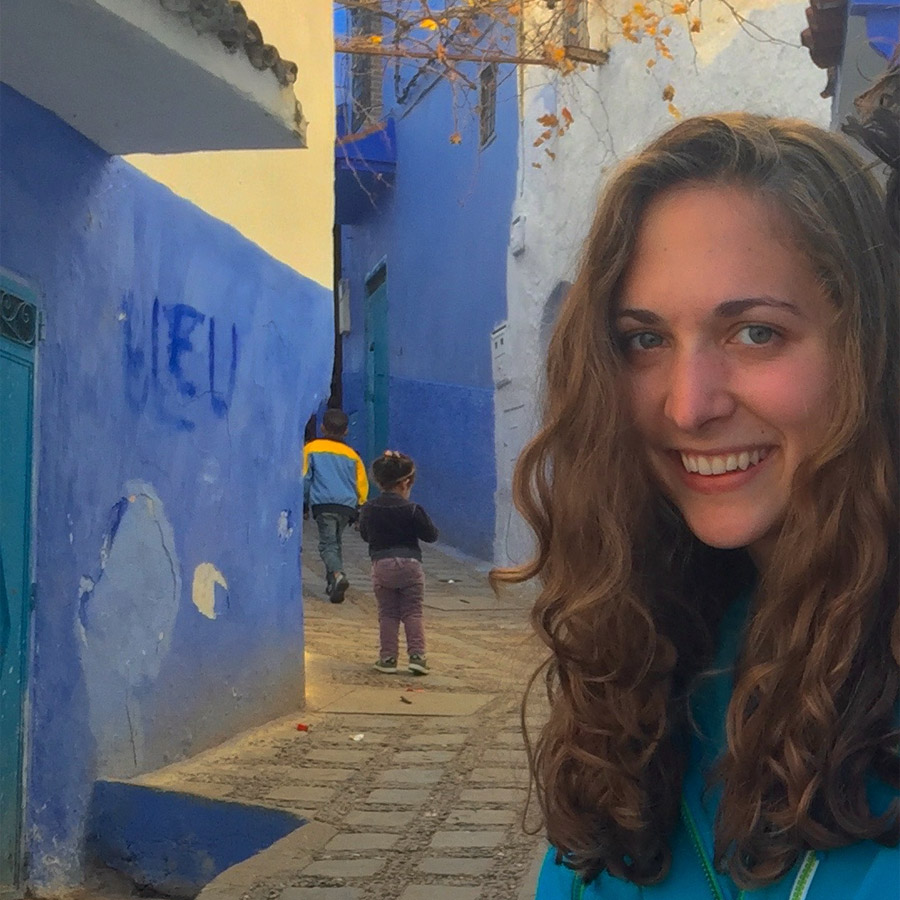Contact Us
Student Spotlight
Jessie Ebersole is currently enrolled in the MA TESOL program and is in her third semester of study. In this Student Spotlight, Jessie tells how she became interested in teaching, discusses qualities of a good teacher, and gives advice to new MA TESOL students.

Jessie EbersoleMA TESOL
When did you first become interested in TESOL?
I am the oldest of four, and as a kid I would make my siblings be my students. I liked to create worksheets, although I doubt my pedagogy was very sound. I was also curious about the rest of the world, and would devour books set in other countries. Although I have always enjoyed teaching, and had an interest in interacting with people from other cultures, these two threads did not intersect until college, when I volunteered on a whim as an English tutor for the Somali Bantu Community Association of Vermont.
Did you have any teaching experience before you enrolled in the TESOL program?
After college I moved to D.C., and I started volunteering as an English teacher at the Washington English Center. They most needed instructors for their classes for beginning students, so by chance this was the population I became most familiar with. The classes contained teenagers and grandparents, with a range of country and language backgrounds. Some were literate in their first language, others had limited formal education. I began to see how all this diversity had the potential to lead to rich classroom interactions, while also posing pedagogical challenges. Over the course of three years I started to figure out what worked through trial and error. I became interested in attaining an academic perspective on my classroom practices, and applied to AU.
Have you experienced any cross-cultural misunderstandings when teaching?
I am afraid I can’t think of one particular memorable moment or experience. I have found, particularly in my current teaching job, that the American idea of “good writing” is far from universal. Students from other countries may have different views about what counts as plagiarism, or where the best place in an essay is to state your main idea. I have found the “Writing Across Borders” video series from Oregon State University to sometimes match my experiences: https://www.youtube.com/watch?v=quI0vq9VF-c.
Are you currently teaching English? If yes, where and what is your learner population?
I am currently teaching at American University’s English Language Training Academy (ELTA). My course, AU in the World, is part of ELTA’s International Accelerator Program, designed to prepare students to attend college in the U.S. Most of the students in this program are Chinese, in their late teens or early 20s.
In your opinion, what makes a successful language learner and teacher?
A successful language learner seeks out opportunities to communicate, inside and outside of class. They are not afraid to take risks and make mistakes. A successful language teacher builds students’ confidence and propels them to talk. She designs lessons based on authentic language and “real” situations, so that students can apply what they learn to their lives outside of class.
What do you plan to do after you complete the TESOL program? Are you planning on staying and teaching in the US after you obtain your degree?
I am not sure where I would like to end up after I finish my degree. There are many great schools in DC where I would be excited to teach. At the same time, gaining a new perspective from working in another country is an appealing option.
What interests do you pursue outside of the classroom?
I love being outdoors, and for a city, DC has a fair amount to do outside. I enjoy kicking a soccer ball around the Mall, kayaking along the Potomac, and exploring bike trails like the Mt. Vernon trail. In the summer there is also a lot of great live music outside. I also love reading novels on any subject.
What advice can you give to our new MA TESOL students?
Seek out opportunities to volunteer in DC. The articles you read for class will be more meaningful and memorable if you can apply them to your own experiences teaching. Take notes on everything you read, and find a personal organization system that works well for you. You are building a knowledge base that you can draw on for the rest of your life. You never know when it will be useful to reference something you read. Introduce yourself to me and other second year students and ask us questions!